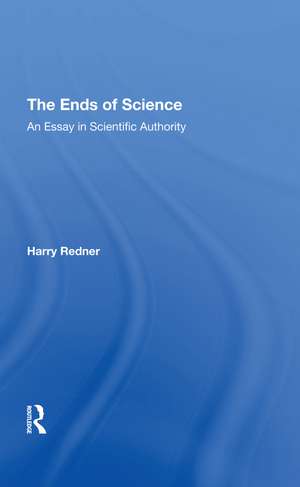The Ends Of Science: An Essay In Scientific Authority
Autor Harry Redneren Limba Engleză Hardback – 13 sep 2019
| Toate formatele și edițiile | Preț | Express |
|---|---|---|
| Paperback (1) | 389.38 lei 6-8 săpt. | |
| Taylor & Francis – 31 mai 2021 | 389.38 lei 6-8 săpt. | |
| Hardback (1) | 767.07 lei 6-8 săpt. | |
| Taylor & Francis – 13 sep 2019 | 767.07 lei 6-8 săpt. |
Preț: 767.07 lei
Preț vechi: 1029.08 lei
-25% Nou
Puncte Express: 1151
Preț estimativ în valută:
146.78€ • 152.95$ • 121.53£
146.78€ • 152.95$ • 121.53£
Carte tipărită la comandă
Livrare economică 03-17 aprilie
Preluare comenzi: 021 569.72.76
Specificații
ISBN-13: 9780367291778
ISBN-10: 0367291770
Pagini: 360
Dimensiuni: 152 x 229 mm
Greutate: 0.61 kg
Ediția:1
Editura: Taylor & Francis
Colecția Routledge
Locul publicării:Oxford, United Kingdom
ISBN-10: 0367291770
Pagini: 360
Dimensiuni: 152 x 229 mm
Greutate: 0.61 kg
Ediția:1
Editura: Taylor & Francis
Colecția Routledge
Locul publicării:Oxford, United Kingdom
Cuprins
Preface -- From Classical Science to World Science -- The Great Transformation -- Science and Progress -- The Characteristics of World Science -- Knowledge and Authority -- Knowledge and Authority: An Introduction -- The Forms of Scientific Authority -- Pathologies of Science -- A Scientific Reformation -- The Main Movements of Reform -- On the Way to Future Science
Notă biografică
Harry Redner is senior lecturer in the Faculty of Economics and Politics at Monash University, Melbourne, Australia. In 1987 he is a senior Fulbright Fellow at both the Institute for Social and Policy Studies, Yale University, and the University of California, Berkeley. He is the author of In the Beginning Was the Deed: Reflections on the Passage of Faust (1982), The Ends of Philosophy: An Essay in the Sociology of Philosophy and Rationality (1986), and (with Jill Redner) Anatomy of the World (1983).
Descriere
This book provides a systematic study of how the epistemologically interesting features of contemporary science are to be understood. It argues that the shift from Classical science to a more complex and less orderly World science after World War II has changed the way scientific research is done.
